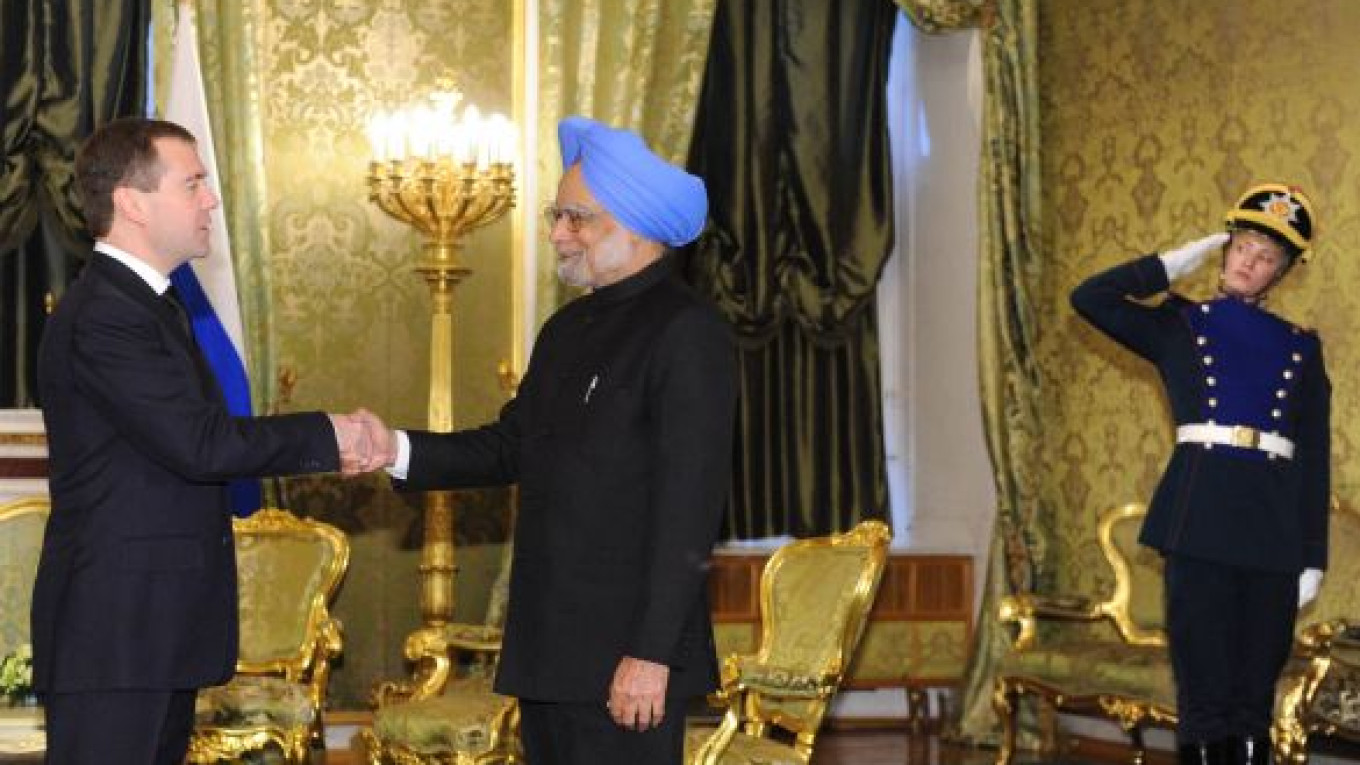The Kremlin won a coveted agreement with India to boost cooperation in the civilian use of nuclear technology on Monday and promised to deliver a long-delayed aircraft carrier.
The nuclear deal was possible because the United States, eager to win lucrative contracts with India, successfully lobbied for the Nuclear Suppliers Group to lift a ban on importing nuclear technologies to India last year.
But Monday’s agreement during a visit to Moscow by Indian Prime Minister Manmohan Singh, means that Russia will be the first country to capitalize on the end of the ban — a fact that was not lost on Rosatom, the state nuclear power company.
“It’s important for Russia that it was the first country to sign an agreement on civil nuclear cooperation with India after the ban was abolished,” Rosatom spokesman Sergei Novikov told The Moscow Times.
In addition to the United States, Russia is jostling with France and Canada for a slice of India’s nuclear power market. Russian analysts said India’s choice of partners would be political.
“There are political factors that will play a role in India’s decision in favor of one of the rivals for its nuclear power market,” said Andrei Volodin, head of the Center for Eastern Studies at the Diplomatic Academy of the Foreign Ministry.
“The [Indian] government should make a decision on whether India will develop as a self-consistent country or as part of a unipolar world with the U.S. as the center,” he said.
Russian and Indian officials offered few details about Monday’s nuclear cooperation agreement.
“Today we have signed an agreement that broadens the reach of our cooperation beyond the supply of nuclear reactors to areas of research and development and a whole range of areas of nuclear energy,” Singh said at a joint news conference with President Dmitry Medvedev after holding talks in the Kremlin.
The agreement replaces one signed by Russia and India in 1998.
India also handed Rosatom a contract to build four more reactors for its nuclear power station in Kudankulam, located in the Tamil Nadu state in southern India.
“The nuclear power station in Kudankulam is already a symbol of our cooperation in civil nuclear energy. Four more reactors will be constructed,” Singh said, Interfax reported.
Rosatom chief Sergei Kiriyenko said the two sides had also agreed on the construction of a nuclear power station in West Bengal and a third site was under discussion.
“A third site is possible for Russia, but a decision has not been made so far,” he told reporters, Interfax reported.
Rosatom may build four to six reactors in West Bengal, and the contract would take 10 to 15 years to fulfill, he said.
The first reactor at the Kudankulam station would start as early as next year, he said.
Kiriyenko added that Rosatom was not afraid of competition, saying the nuclear market was global and rivalry was inevitable.
Novikov, the Rosatom spokesman, denied that Monday’s agreement was political.
“There is no political background here. This is pure business,” he said by telephone. “The Indian market is so big that there will be place for everyone there.”
He said France was Russia’s main rival in the Indian market.
Also Monday, Russia and India reached an agreement on the renovation of the Admiral Gorshkov, a Soviet-era aircraft carrier purchased by the Indian military under a $1.6 billion contract in 2004, a source in the Russian delegation told Interfax.
“All the parameters that should be in the contract have been agreed on,” the source said, without elaborating.
Russia was to deliver the refurbished vessel by 2008, but delivery has been pushed back to 2012 and its price nearly doubled to $2.8 billion.
Separately, state-owned Vneshekonombank said in a statement that it would take a $100 million loan from the Export-Import Bank of India to finance the delivery of equipment and services from Indian companies seeking to invest in Russia.
A Message from The Moscow Times:
Dear readers,
We are facing unprecedented challenges. Russia's Prosecutor General's Office has designated The Moscow Times as an "undesirable" organization, criminalizing our work and putting our staff at risk of prosecution. This follows our earlier unjust labeling as a "foreign agent."
These actions are direct attempts to silence independent journalism in Russia. The authorities claim our work "discredits the decisions of the Russian leadership." We see things differently: we strive to provide accurate, unbiased reporting on Russia.
We, the journalists of The Moscow Times, refuse to be silenced. But to continue our work, we need your help.
Your support, no matter how small, makes a world of difference. If you can, please support us monthly starting from just $2. It's quick to set up, and every contribution makes a significant impact.
By supporting The Moscow Times, you're defending open, independent journalism in the face of repression. Thank you for standing with us.
Remind me later.


